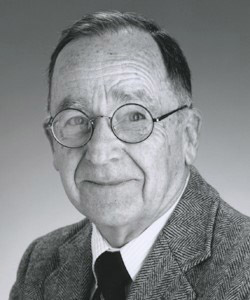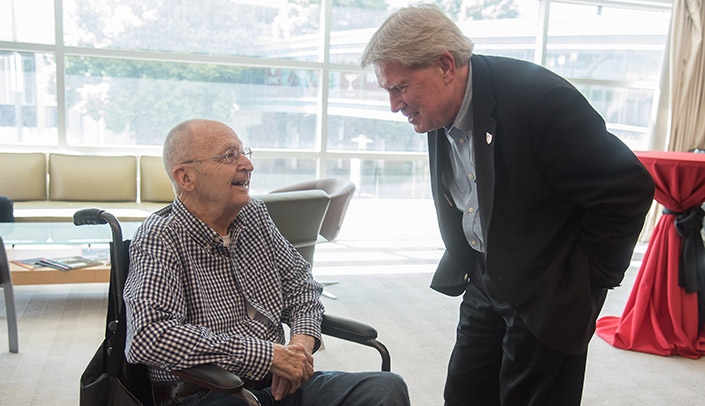Known as a quiet force who transformed the medical center and ushered in a modern era of transplantation and research, Charles Andrews, M.D., the fourth chancellor of the University of Nebraska Medical Center, died Saturday, Nov. 16, at Nebraska Medicine following a recent stroke. He was 94.
 |
Charles Andrews, M.D. |
Born Jan. 22, 1925 in Stratford, Okla., Dr. Andrews was instrumental in establishing UNMC as a leader in solid organ and bone marrow transplantation, now among the leading programs in the world, and set the institution on the path of becoming a major academic medical center.
In 1983, Dr. Andrews became chancellor and during the next eight years, increased the emphasis on research, building the total research grants from $5.8 million to $19.6 million by 1990.
“Charlie was quiet in manners, but he wouldn’t flinch. He was surprisingly strong,” said John Niemann, Ed.D., former senior vice president of development, University of Nebraska Foundation.
“President Theodore Roosevelt was characterized as a man who spoke softly, but carried a big stick. That was Charlie. He never raised his voice. When he made a decision, he found a way to make it happen. He wouldn’t tell you something twice. He was reliable and dependable. He wanted to make UNMC outstanding.”
Colleagues describe Dr. Andrews as a quiet, private man with a low-key sense of humor. He quickly won over the faculty, students and professional staff at UNMC with his no-nonsense approach to administration. His formula for success was simple: Obtain the best facilities, recruit top faculty members and researchers and let them do their work.
He realized the medical center was good, but there were no star programs to make UNMC great. He targeted five areas — cancer, transplantation, rural health, geriatrics and biotechnology.
Dr. Andrews teamed up with then University of Nebraska at Omaha Chancellor Del Weber, to “start a revolution” to improve the image of both UNO and UNMC. “They didn’t tolerate being treated like second-class citizens,” Dr. Niemann said.
It was through dogged determination, and a threat to close the College of Pharmacy, that Dr. Andrews got the money to start the liver transplantation program in 1985, which has become part of a world-class solid organ transplant program.
When Dr. Andrews arrived at UNMC, the Eppley Institute for Research in Cancer and Allied Diseases was one of 15 basic laboratory research centers in the U.S. Under his leadership, an addition to the building was planned, the bone marrow transplant program was expanded and the Nebraska Lymphoma Project was founded.
Today, the Eppley Institute is under the umbrella organization of the Fred & Pamela Buffett Cancer Center and is one of 69 National Cancer Institute-designated centers in the country.
Dr. Andrews also was a driving force in the initiation of several UNMC programs that address the shortage of health professionals in rural Nebraska. Such interdisciplinary workforce pipeline programs as the Rural Health Education Network (RHEN) and the Rural Health Opportunities Program (RHOP) have grown across the state to include all state colleges, the University of Nebraska at Kearney and an urban component.
The University Geriatric Center opened in 1988 for students in allied health, dentistry, pharmacy and nursing to receive training in geriatric care. About the same time, a boost was given to biotechnology through genetic research, the establishment of a combined bachelor of science degree program with UNO and federal and state funding for equipment and lab facilities.
Prior to joining UNMC in 1983, Dr. Andrews was a faculty member and vice president for health science at the West Virginia University Medical Center, Morgantown, for 21 years. Before that, he held faculty posts at the University of Minnesota, Minneapolis, the University of Kansas City School of Dentistry and the University of Kansas Medical Center in Kansas City.
Dr. Andrews remained active following his retirement from UNMC. From 1994-1995, he served as interim executive vice chancellor for the University of Kansas Medical Center. In addition, he also served a stint as chief medical officer for the state of Nebraska in the late 1990s.
He served in the U.S. Army during World War II from 1943 to 1946. He then served as a captain in the U.S. Air Force from 1951 to 1953 during the Korean War.
Survivors include his first wife, Evelyn Andrews, W. Lebanon, N.H.; their two daughters, Mary Andrews (husband, V.S. Subrahmanian), Hanover, N.H., and Evelyn Reilly, Grants, N.M.; stepson, Jeffrey Paoletti, Brooklyn, N.Y.; and two grandchildren, Nathan and Annika Subrahmanian, Hanover, N.H.
Dr. Andrews was preceded in death by his second wife of 33 years, Theresa (Terry) Paoletti, who died in 2017 at the age of 86. Terry Andrews was his wife during his years as chancellor of UNMC.

Dr. Andrews was the fourth (counting one interim) chancellor that I served under when he came to UNMC. He was a quiet individual. Firm but fair in his dealings with people. Valued all employees and their thoughts and opinions. He listened. When we would be preparing for budget hearings, he would tell us to look toward the goal of building that necessary foundation which would make us world class. And that foundation he did build. A visionary leader and a good man.
What an incredible loss! My prayers for comfort during grieving go out to the family and loved ones of Dr. Andrews. Thank you Dr. Andrews, for your service at UNMC, UNO, and our country!
I first met Dr. Andrews when he was the Chief Medical Officer for the State of Nebraska during the reorganization of the Health and Human Services System. I was fortunate to serve as his administrative assistant and got to observe him in meetings with other state leaders. It's hard to put into words what a vital impact he had in those early discussions. His wisdom and keen insights were a godsend during those early days of trying to restructure a huge organization. I've heard many say that he was the "tipping point" at UNMC and I agree. I'm grateful to have known him.
My favorite story with Dr. Andrews. I had just started in PR 32 years ago. Dr. Andrews gave me his ground rules. He said, "We're a state institution. We're an open book. We have no secrets. Just don't give me any surprises." Coming from a corporate PR background, it was the the most refreshing thing I had ever heard an executive utter. RIP, Charlie, and thank you for all did for our medical center.
I was Dean of the UNMC College of Nursing during the full time Dr. Andrews was Chancellor. He was a very fair man. Nursing was on the budget cutting block at the same time as pharmacy.. Pharmacy questioned his judgment, but we just kept hammering the nursing shortage. When it was all over, Dr. Andrews fired the Dean of Pharmacy and sent me a hand-written thank you note for running a clean campaign. Rosalee C. Yeaworth
After accepting the role of acting dean of the College of Pharmacy, at my request, I met with Chancellor Andrews on a weekly basis. I found Dr. Andrews to be a no non-sense person with a 'dry' laugh and 'dry' sense of humor. He was a "tell it like it is" person. I liked, and enjoyed, that. A comment he made during one of our meetings that stuck with me was "I don't tell lies, but sometimes I forget what the truth is." I learned a lot working for and with Dr. Andrews, and value the experiences and time spent together.